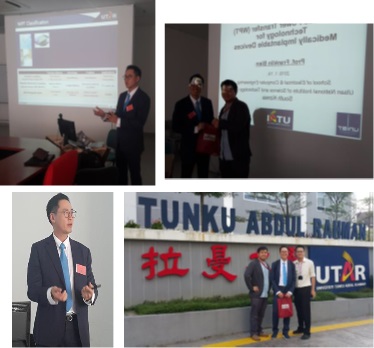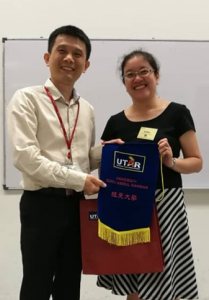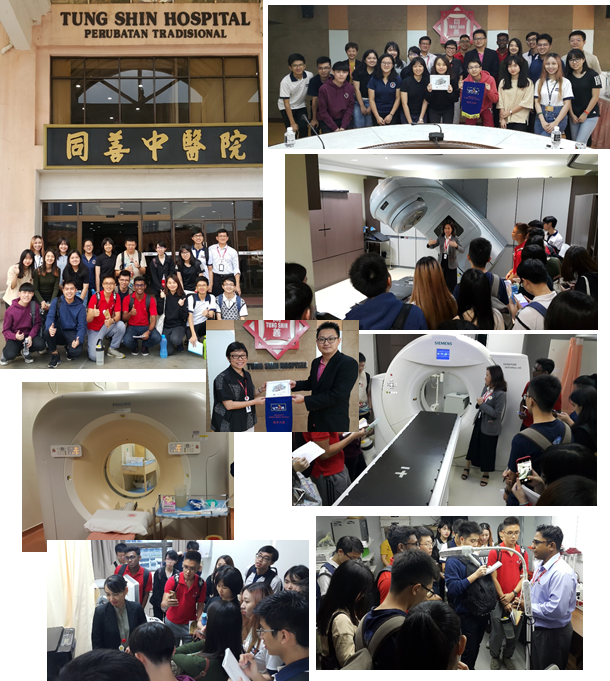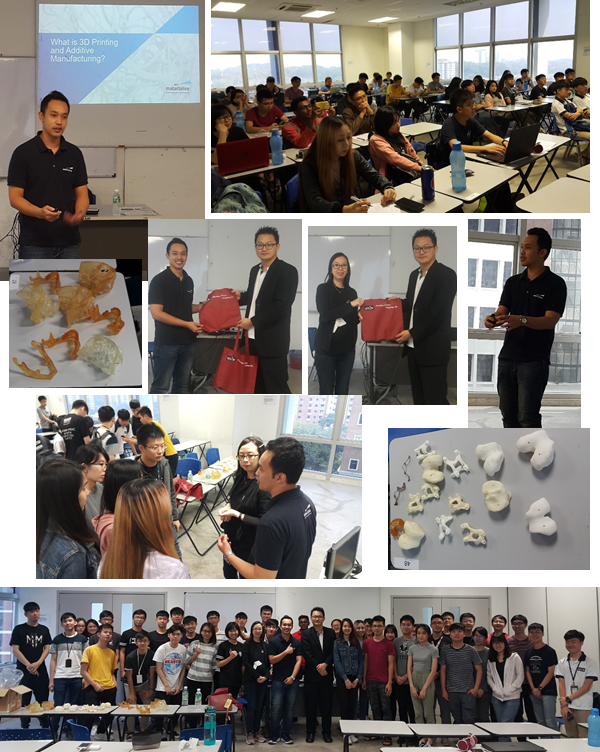
| Centre Name: | 
Centre for Healthcare Science and Technology (CHST) |
| Chairperson: | Dr. Tee Yee Kai |
| Description of Centre: | CHST is established to become a leading center of excellence for human, industry and intellectual capital development of healthcare science and technology in Malaysia. |
| Research area: |
This is a highly multi-disciplinary center with medical and non-medical members coming from many different departments and faculties of UTAR thus the research areas are very broad. Some of the members’ expertises and research interests are listed below (a non-exhaustive list):
|
| NO. | NAME | FACULTY | MEMBER |
|---|---|---|---|
| 1 | Dr. Tee Yee Kai | LKCFES | Full |
| 2 | Dr. Chan Siow Cheng | LKCFES | Full |
| 3 | Mr. Chong Yu Zheng | LKCFES | Full |
| 4 | Mr. Danny Ng Wee Kiat | LKCFES | Full |
| 5 | Mr. Chua Yea Dat | LKCFES | Full |
| 6 | Prof. Ir. Dr. Goi Bok Min | LKCFES | Full |
| 7 | Dr. Humaira Nisar | FEGT | Full |
| 8 | Dr. Kong Sin Guan | LKCFES | Full |
| 9 | Dr. Lee Poh Foong | LKCFES | Full |
| 10 | Dr. Mok Siew Ying | LKCFES | Full |
| 11 | Dr. Tee Shiau Foon | LKCFES | Full |
| 12 | Dr. Kwan Ban Hoe | LKCFES | Full |
| 13 | Dr. Tang Pek Yee | LKCFES | Full |
| 14 | Dr. Tan Lee Fan | LKCFES | Full |
| 15 | Dr. Hum Yan Chai | LKCFES | Full |
| 16 | Mr. Teoh Boon Yew | LKCFES | Full |
| 17 | Ms Tan Yin Qing | LKCFES | Full |
| 18 | Dr Loo Joo Ling | LKCFES | Full |
| 19 | Dr Wisam Abdul-Kadder Yassin Al-Obaidy | FMHS | Full |
| 20 | Mr Wang Chaozheng | FMHS | Full |
| 21 | Dr Avneet Kaur | FMHS | Associate |
| 22 | Dr Ahmed Waleed Khalid Hendi | FMHS | Associate |
| 23 | Dr. Simerjit Singh | FMHS | Associate |
| 24 | Dr Chang Jing Jing | FICT | Associate |
| No. | Date | Event |
|---|---|---|
| 1 | 11-Jan-19 | Technical Visit to Boston Scientific |
| 2 | 18-Jan-19 | Wireless power transfer technology for medically implantable devices |
| 3 | 19-Mar-19 | Trends in the Operating Theatre: Hybrid Operating Rooms (Hybrid ORs) |
| 4 | 19-Mar-19 | Materialise Medical Services - Touching the Lives of Others |
| 5 | 25-May-19 | Wellbeing of Mind and Body |
| 6 | 5-Jul-19 | Development of an AI-based Non-invasive Pulse AudioGram (PAG) Monitoring Device for Arrhythmia Screening |
| 7 | 19-Jul-19 | Wearable Sensing and Sensor Networks for Precision Medicine |
| 8 | 9-Aug-19 | Visit cum Study Tour to Tung Shin Hospital |
| 9 | 15-Aug-19 | 3D printing technology assisting surgery procedure for a better and healthier world |
| 10 | 17-Dec-19 | Visit by Wannan Medical College, China |
| No. | Date | |
|---|---|---|
| 1 | Wireless power transfer technology for medically implantable devices
Speaker: Prof. Franklin Bien School of Electrical & Computer Engineering Ulsan National Institute of Science and Technology (UNIST), Korea Date: 18 January 2019 Time: 4 – 5 pm Venue: KB803, Sungai Long Campus, UTAR Modern medical treatment and diagnoses benefit from IT technologies ranging from small pill transceiver devices to permanent implanted devices. Either case must communicate to the external devices for the medical expert to view. Moreover, these devices require certain form of power supply in order for the device to function properly. Recently, the demand for functionality in such endoscopy device is ever increasing to enable HD quality imaging, actuators for signature implant, and locomotive for accurate positioning. Moreover, alternative methods to monitor glucose levels has come to an implantable continuous glucose monitoring sensors adopting wireless power transfer technologies. In order to minimize the necessary battery size enclosed by the implanted biomedical devices, wireless power transfer [WPT] technique is considered differently from consumer electronics. Due to random positioning and miniaturized size of the implanted sensors and devides, applying WPT technology may not be trivial. In this talk, various WPT technologies for medically implanted devices are analyzed. Some of the issue is studied, and possible solution is presented. |

|
| 2 | Trends in the Operating Theatre: Hybrid Operating Rooms (Hybrid ORs)
Speaker: Ir. Dharmesh R Doshi Associate Director, Asia Pacific at ECRI Institute Date: 19 March 2019 Time: 11 am – 12 pm Venue: KB210, Sungai Long Campus, UTAR In this talk, the latest trends in the hybrid operating rooms were introduced. The speaker shared some of the issues faced by the current hospitals to setup the hybrid operating rooms and cost was one of the biggest obstacles, followed by space and expertise. The pros and cons of the hybrid operating rooms were discussed and currently, only University Malaysia Hospital and Universiti Kebangsaan Malaysia Hospital had the hybrid facilities in Malaysia. |

|
| 3 | Materialise Medical Services – Touching the lives of others
Speaker: Mr. Zainal Aziz, Ms. Yessy Process Engineer, HR Business Partner of Materialise Date: 19 March 2019 Time: 11 am – 1 pm Venue: KB204, Sungai Long Campus, UTAR The speaker, Mr. Zainal Aziz pursued his degree in Medical Imaging from University Malaya and joined Materialise since 2013. He have more than 5 years’ experience in the Medical Services Department. He first started as Knee Conversion Engineer. Over the years, his career has evolved into different roles, e.g. CMF Conversion Engineer, Quality Engineer, and Design Engineer. Currently, he is a Process Engineer who is responsible in analysing a process, identifying any potential changes and implementing the process changes in the 3D printing of medical models. The talk started with the emcee introducing the background of Mr. Zainal. Then, Mr. Zainal introduced more about himself and Materialise. Materialise was founded in 1990 in Belgium and created a range of software solutions and 3D printing services. Materialise Medical has pioneered many leading medical applications of 3D Printing and is enabling researchers, engineers and clinicians to revolutionize innovative patient-specific treatment that helps improve and save lives. Mr. Zainal demonstrated how the images taken from computerized tomography (CT) Scan and magnetic resonance imaging (MRI) are converted into 3D models, how the 3D printed models help the patient and the surgeon during the medical procedures, and how the 3D printing technology revolutionize the medical field. Mr. Zainal also highlighted each of the roles of design engineer, conversion engineer, process engineer, quality engineer, and the clinical engineer in the process of prototype development and application. At the end of the presentation, Mr. Zainal shared some real-life cases he has involved and testimonials of patient benefited from Materialise’s 3D medical printing solutions. An interactive Q&A session started when Ms. Yessy showed the participants some actual 3D printed prototypes from Materialise such as carnio-maxillofacial models, joint models, joint implants, and surgical guides. These prototypes are very fine printed with polyamide, resin, titanium, etc. The participants were very excited to hold and feel these impressive prototypes. The talk ends with the giving of token of appreciation to Mr. Zainal and Ms. Yessy and with a group photo taken. The participants enjoyed the event very much because it not only enhanced their knowledge in medical printing technology but also learned more about their future career prospects. |

|
| 4 | Development of an AI-based Non-invasive Pulse AudioGram (PAG) Monitoring Device for Arrhythmia Screening
Date : 5 July 2019 Time : 09:30 am - 11:30 am Venue : KB325, Sungai Long Campus, UTAR Speaker profile: Dr. Che-Wei Lin, graduated with a B.S., Electrical and Control Engineering from National Chiao Tung University, Taiwan in year 2006. Later, he obtained his M.S., Information Technology from University of Milan, Italy in year 2009 and PhD. Electrical Engineering from National Cheng Kung University, Taiwan in year 2011. His research interests include Artificial Intelligence-based Biomedical Signal Processing, Wearable Device Design, Virtual Reality Medical-based Assistive System and Artificial Intelligence-based Surgery Assistive System. Dr. Lin gave a talk regarding “Development of an AI-based Non-invasive Pulse AudioGram (PAG) Monitoring Device for Arrhythmia Screening” to the interested staff and students at UTAR on 5 July 2019. He shared an AI-based non-invasive PAG monitoring device used to measure the audio-signal in radial artery which is generated by haemodynamics. The PAG monitoring device consists of four components: an audiogram sensor, an analog-digital converter, a microprocessor and a data storage. He also developed an AI-based arrhythmia detection algorithm to show the developed prototype could detect arrhythmia robustly and reliably although the measured signals were small and noisy. The audiences found the talk was very interesting and informative. The talk ended successfully at 12.30 pm. 
|

|
| 5 | Wearable Sensing and Sensor Networks for Precision Medicine
Date : 19 July 2019 Time : 03:00 pm – 04:30 pm Venue : KB208, Sungai Long Campus, UTAR The talk was held in conjunction between IEEE-Engineering in Medicine and Biology Society (IEEE-EMBS) Malaysia Chapter, UTAR IEEE-EMBS Student Chapter, Centre of Healthcare Science and Technology, and Department of Mechatronics and Biomedical Engineering. Dr. Carmen Poon from Chinese University of Hong Kong shared various telemedicine technologies available for various health conditions. Feedbacks are critical to the prediction and tailoring of treatments to each individual. This is made possible nowadays by wearable and mobile devices. Nevertheless, designing a sensor network with these devices and training the prediction models associated with them to ultimately change surgical practices are challenging. This talk discussed the following: 1. different types of wearable sensors and sensor networks for collecting streamlines of biomedical/health information; 2. how knowledge learnt from large-scale online public sources can be transferred to better utilize the collected information for predicting surgical/clinical outcomes and realizing real-time automated interventions. |


|
| 6 | Tung Shin Hospital Visit
Date : 9 August 2019 Time : 1 pm - 4 pm Venue : Tung Shin Hospital 同善医院 Tung Shin Hospital (同善医院), formerly known as Pooi Shin Thong, is a 346-bed tertiary acute care hospital. The not-for-profit private hospital is accredited by the Malaysian Society for Quality in Health and ISO 9001:2008 certified. It started as a provider of traditional Chinese Medicine treatment in 1881, and the Western Medicine division commenced operations in 1985. A group of biomedical engineering students visited the hospital jointly organized by CHST and DMBE on 9 August 2019. The main purpose of this visit was to provide exposure to biomedical engineering undergraduates on the daily hospital operations and management, including the various in-patient and out-patient departments with emphasis on medical equipment and technology, facility management and supporting engineering (mechanical and maintenance) services in an actual hospital environment. All the students found this visit very useful and they asked many questions during the visit. |

|
| 7 | 3D Printing Technology Assisting Surgery Procedure for a Better and Healthier World
Date : 15 August 2019 Time : 10:30 am - 12:00 pm Venue : KB324, Sungai Long Campus, UTAR Mr Erwan Siddiq gave a talk regarding how 3D printing technology assisting surgery procedure for a better and healthier world at UTAR. In the talk, the speaker covered:
Speaker’s profile: Mr Erwan Siddiq graduated from University Technology Malaysia with a Bachelor’s degree in Biomedical Engineering. He started working in Materialise as a Medical Service Engineer for the Cranio-maxillo-facial (CMF) product immediately after his graduation. His true passion lay in people and management – he has advanced his career as a Team Leader for CMF Plastic team in Malaysia in 2 years’ time. He is currently the global coordinator for CMF Plastic Design processes and a member of Materialise Malaysia Ambassadors. |

|